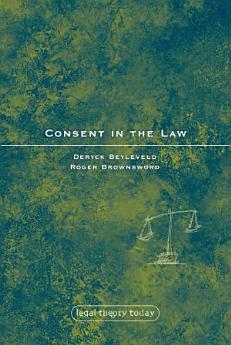Consent in the Law
Jan 2007 · Bloomsbury Publishing
E-Book
406
Seiten
reportBewertungen und Rezensionen werden nicht geprüft Weitere Informationen
Über dieses E-Book
In a community that takes rights seriously, consent features pervasively in both moral and legal discourse as a justifying reason: stated simply, where there is consent, there can be no complaint. However, without a clear appreciation of the nature of a consent-based justification, its integrity, both in principle and in practice, is liable to be compromised.
This book examines the role of consent as a procedural justification, discussing the prerequisites for an adequate consent -- in particular, that an agent with the relevant capacity has made an unforced and informed choice, that the consent has been clearly signalled, and that the scope of the authorisation covers the act in question. It goes on to highlight both the Fallacy of Necessity (where there is no consent, there must be a wrong) and the Fallacy of Sufficiency (where there is consent, there cannot be a wrong). Finally, the extent to which the authority of law itself rests on consent is considered.
If the familiarity of consent-based justification engenders confusion and contempt, the analysis in this book acts as a corrective, identifying a range of abusive or misguided practices that variously under-value or over-value consent, that fictionalise it or that are fixated by it, and that treat it too casually or too cautiously. In short, the analysis in Consent in the Law points the way towards recognising an important procedural justification for precisely what it is as well as giving it a more coherent application.
This book examines the role of consent as a procedural justification, discussing the prerequisites for an adequate consent -- in particular, that an agent with the relevant capacity has made an unforced and informed choice, that the consent has been clearly signalled, and that the scope of the authorisation covers the act in question. It goes on to highlight both the Fallacy of Necessity (where there is no consent, there must be a wrong) and the Fallacy of Sufficiency (where there is consent, there cannot be a wrong). Finally, the extent to which the authority of law itself rests on consent is considered.
If the familiarity of consent-based justification engenders confusion and contempt, the analysis in this book acts as a corrective, identifying a range of abusive or misguided practices that variously under-value or over-value consent, that fictionalise it or that are fixated by it, and that treat it too casually or too cautiously. In short, the analysis in Consent in the Law points the way towards recognising an important procedural justification for precisely what it is as well as giving it a more coherent application.
Autoren-Profil
Deryck Beyleveld is Professor of Law and Bioethics at the University of Durham
Roger Brownsword is Professor of Law at King's College, London
Roger Brownsword is Professor of Law at King's College, London
Dieses E-Book bewerten
Deine Meinung ist gefragt!
Informationen zum Lesen
Smartphones und Tablets
Nachdem du die Google Play Bücher App für Android und iPad/iPhone installiert hast, wird diese automatisch mit deinem Konto synchronisiert, sodass du auch unterwegs online und offline lesen kannst.
Laptops und Computer
Im Webbrowser auf deinem Computer kannst du dir Hörbucher anhören, die du bei Google Play gekauft hast.
E-Reader und andere Geräte
Wenn du Bücher auf E-Ink-Geräten lesen möchtest, beispielsweise auf einem Kobo eReader, lade eine Datei herunter und übertrage sie auf dein Gerät. Eine ausführliche Anleitung zum Übertragen der Dateien auf unterstützte E-Reader findest du in der Hilfe.







